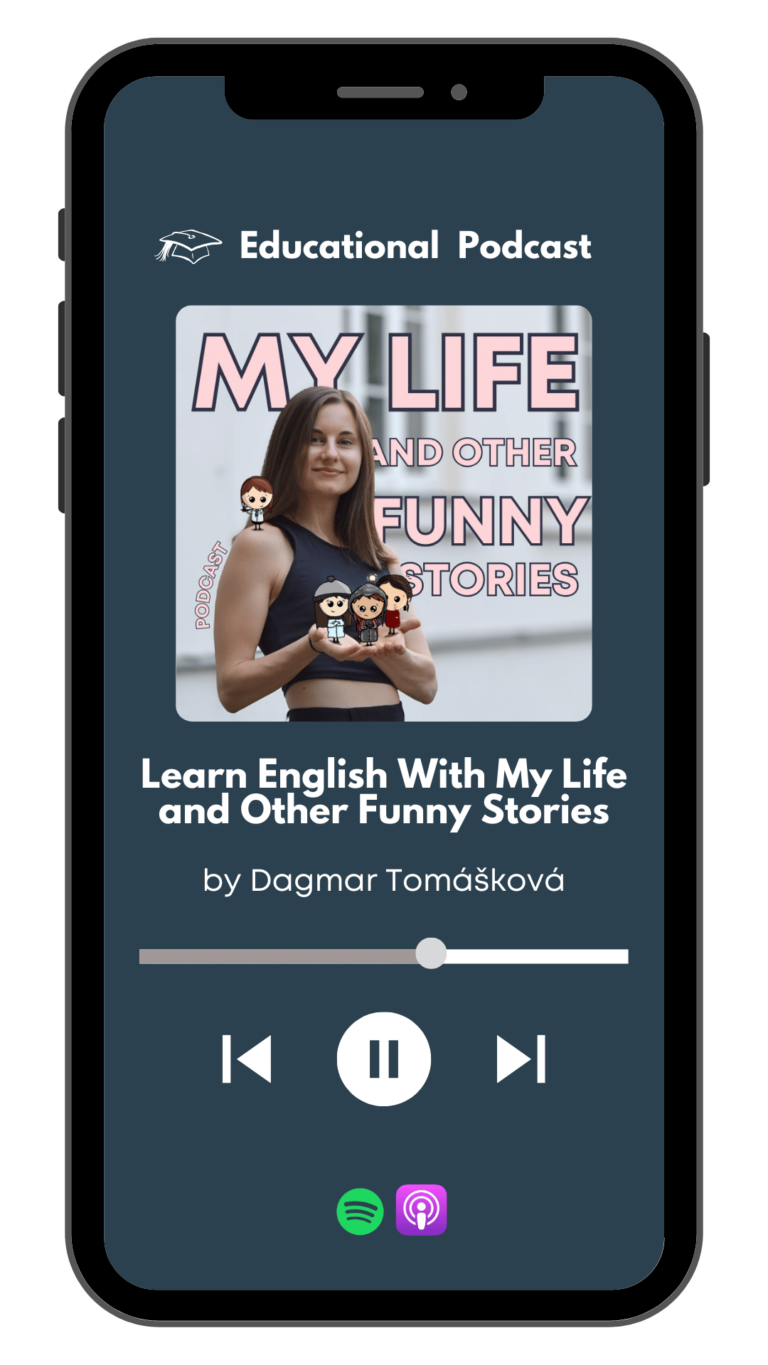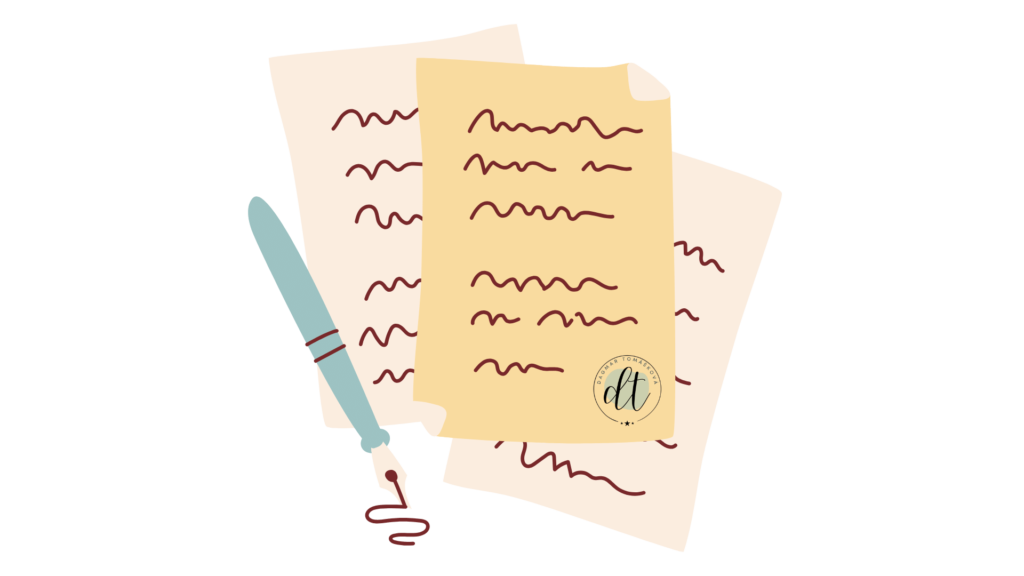
Ep.101: „She said that…“ – Reported Speech In English
Today we’re going to talk about grammar, and not just any grammar – an intermediate grammar that any student at the B1 level should know. It is something many students find a bit confusing, but once you understand the logic, it’s actually not that bad. The topic is reported speech, also called indirect speech.

LISTEN TO THE EPISODE HERE:
soon <3

Pokud chceš tento podcast a mou tvorbu podpořit, teď můžeš tady!

WRITTEN TRANSCRIPTION OF THE PODCAST
Hello and welcome to my podcast My Life and Other Funny Stories. My name is Dagmar Tomášková, I am an English tutor and coach and I created this podcast for English students who want to improve their oral comprehension. As always, you can find the transcription of this episode and vocabulary list in the notes of the podcast.
Today we’re going to talk about grammar, and not just any grammar – an intermediate grammar that any student at the B1 level should know. It is something many students find a bit confusing, but once you understand the logic, it’s actually not that bad. The topic is reported speech, also called indirect speech.
So, what is reported speech? Basically, it’s when you tell someone what another person said, but you don’t use their exact words. Instead, you shift it into your own sentence. For example, if my friend says: “I’m tired,” and later I tell you about it, I don’t usually repeat the exact sentence. I am not saying “I am tired”, because it was not about me, right? Instead, I’ll say: “She said that she was tired.” That’s reported speech.
Now, let’s go a little deeper.
The main thing to notice is that the verb tense usually goes one step back in time. We call this backshifting. Imagine that you’re moving the verb one level backwards. Let me show you the typical changes:
- Present simple → Past simple
Direct: “I like pizza.”
Reported: He said that he liked pizza. - Present continuous → Past continuous
Direct: “I’m reading a book.”
Reported: She said that she was reading a book. - Past simple → Past perfect
Direct: “I watched a movie.”
Reported: He said that he had watched a movie.
Here it gets a little tricky…
- Present perfect → Past perfect
Direct: “I have seen this film.”
Reported: She said that she had seen that film. - Future with will → would
Direct: “I will call you.”
Reported: He said that he would call me.
That’s the classic one-step-back rule.
Now, let’s talk about time expressions, because they often change too.
- today → that day
- tomorrow → the next day / the following day
- yesterday → the day before
- now → then
- this → that
- these → those
For example:
Direct: “I’ll see you tomorrow.”
Reported: She said that she would see me the next day.
Easy, right?
But here comes the good news: sometimes you don’t need to backshift. If the situation is still true, we can keep the same tense. For example:
Direct: “The Earth is round.”
Reported: He said that the Earth is round.
We don’t say was round, because obviously, it’s still round!
Or if you’re reporting something just seconds later, you might also keep the original tense:
Anna: “I’m hungry.”
Me, two minutes later: “She said she’s hungry.”
Both are fine in everyday conversation.
And finally, what about questions?
When we report a question, the word order changes and we don’t use a question mark anymore. We usually add if or whether for yes/no questions.
Direct: “Do you like sushi?”
Reported: She asked if I liked sushi.
And for wh-questions, we just keep the question word but turn it into a normal sentence:
Direct: “Where do you live?”
Reported: He asked where I lived.
So, to sum it up:
- Shift the tense one step back (usually).
- Change the time expressions if necessary.
- Change the word order in questions.
- And remember, sometimes no backshift is needed if it’s still true.
Let’s make it practical. I’ll tell you three little stories and show you how direct speech changes into reported speech.
Story one: My friend and the coffee.
The other day, I was having coffee with my friend Domča. She looked at me and said, “I don’t like Mondays.” I laughed, because honestly, who does? Later, when I was telling my other friend about it, I didn’t quote her word for word. I said: “Domča said that she didn’t like Mondays.”
See what happened? “I don’t like Mondays” became “she didn’t like Mondays.” Present simple → past simple. That’s the most common change.
Story two: Plans for the weekend.
A friend of mine, Terka, was making plans. She told me: “I will visit my parents this weekend.” Later, I told my mom about it, but of course I didn’t use the exact words. I said: “Terka said that she would visit her parents that weekend.”
So “will” became “would”, and “this weekend” became “that weekend.”
Story three: The mystery at the bus stop.
Okay, one more. A while ago, I was waiting at the bus stop and a woman came up to me and asked, “Have you seen bus number 25?” I told her I hadn’t. Later, when I was talking to my friend about it, I said: “A woman asked me if I had seen bus number 25.”
Notice two things: first, “Have you seen” turned into “if I had seen.” Present perfect → past perfect. And second, when it’s a question, we usually change the word order and use if or whether. So “Have you seen…?” becomes “She asked me if I had seen…”
So that’s the basic logic of reported speech. You take the original words, shift the tense back, sometimes change the time expression, and if it’s a question, you also change the word order.
Let me give you a few quick examples for practice – I will give you a few seconds to say the correct answer in a reported speech:
“I’m studying English.” Okay, How would we say it in reported speech? She said that…
Correct answer: She said that she was studying English.
“We watched a movie yesterday.”
We have past tense and then the word yesterday. How would we say it in reported speech? They said that they ….
Correct answer: They said that they had watched a movie the day before.
And last one: “Will you help me?” He asked if….
Correct answer is: He asked if I would help him.
I know, it might sound like a lot of rules, but here’s the thing: the more you read and listen, the more natural it becomes. Reported speech is everywhere – in news articles, in books, in movies and in everyday conversations. People are always telling you what someone else said.
Thank you for listening! If you liked this episode, please leave a five-star rating and share it with your friends. Don’t forget, you can find the transcript and vocabulary list in the notes of the podcast. See you next time. Bye byei

VOCABULARY LIST
intermediate – středně pokročilý
confusing – matoucí
shift (into your own sentence) – posunout (do své vlastní věty)
repeat the exact sentence – zopakovat přesnou větu
backshifting – zpětný posun časů
classic one-step-back rule – klasické pravidlo „o jeden čas zpět“
time expressions – časové výrazy
obviously – očividně
reporting something – podávat zprávu o něčem, reprodukovat
word order – slovosled
wh-questions – otázky začínající na wh- (who, what, where, when, why, how)
sum it up – shrnout to
quote (her word for word) – citovat (doslova, slovo od slova)
mystery – záhada
notice (two things) – povšimnout si (dvou věcí)
might sound like a lot – může znít jako hodně